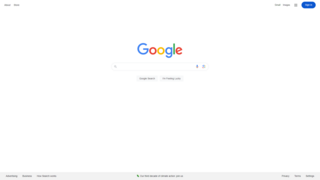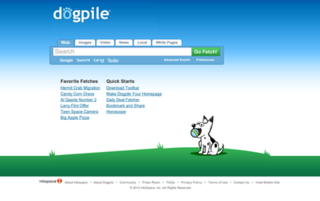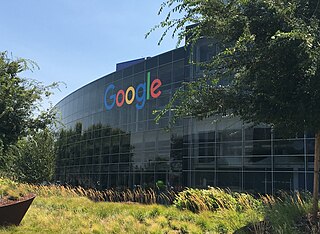
Google Search is a search engine operated by Google. It allows users to search for information on the Internet by entering keywords or phrases. Google Search uses algorithms to analyze and rank websites based on their relevance to the search query. It is the most popular search engine worldwide.
Search engine optimization (SEO) is the process of improving the quality and quantity of website traffic to a website or a web page from search engines. SEO targets unpaid traffic rather than direct traffic or paid traffic. Unpaid traffic may originate from different kinds of searches, including image search, video search, academic search, news search, and industry-specific vertical search engines.
Google Shopping, formerly Google Product Search, Google Products and Froogle, is a Google service created by Craig Nevill-Manning which allows users to search for products on online shopping websites and compare prices between different vendors. Google announced at its Marketing Live event in May 2019 that the new Google Shopping will integrate the existing Google Express marketplace into a revamped shopping experience. In the US, Google Shopping is accessible from the web and mobile apps, available on Android and iOS. Google Shopping is also available in France, accessible from the web only. Like its predecessor, Google Shopping is free and requires a personal Google account in order to purchase from the platform. A colored price tag icon replaces the parachute icon from Google Express.

Dogpile is a metasearch engine for information on the World Wide Web that fetches results from Google, Yahoo!, Yandex, Bing, and other popular search engines, including those from audio and video content providers such as Yahoo!.

Google LLC is an American multinational technology company focusing on artificial intelligence, online advertising, search engine technology, cloud computing, computer software, quantum computing, e-commerce, and consumer electronics. It has been referred to as "the most powerful company in the world" and as one of the world's most valuable brands due to its market dominance, data collection, and technological advantages in the field of artificial intelligence. Google's parent company Alphabet Inc. is one of the five Big Tech companies, alongside Amazon, Apple Inc., Meta, and Microsoft.

Desktop search tools search within a user's own computer files as opposed to searching the Internet. These tools are designed to find information on the user's PC, including web browser history, e-mail archives, text documents, sound files, images, and video. A variety of desktop search programs are now available; see this list for examples. Most desktop search programs are standalone applications. Desktop search products are software alternatives to the search software included in the operating system, helping users sift through desktop files, emails, attachments, and more.
Yahoo! Search is a search engine owned and operated by Yahoo!, using Microsoft Bing to power results.
SafeSearch is a feature in Google Search and Google Images that acts as an automated filter of pornography and potentially offensive and inappropriate content.
Sitemaps is a protocol in XML format meant for a webmaster to inform search engines about URLs on a website that are available for web crawling. It allows webmasters to include additional information about each URL: when it was last updated, how often it changes, and how important it is in relation to other URLs of the site. This allows search engines to crawl the site more efficiently and to find URLs that may be isolated from the rest of the site's content. The Sitemaps protocol is a URL inclusion protocol and complements robots.txt, a URL exclusion protocol.

A search engine is a software system that finds web pages that match a web search. It searches the World Wide Web in a systematic way for particular information specified in a textual web search query. The search results are generally presented in a line of results, often referred to as search engine results pages (SERPs). The information may be a mix of hyperlinks to web pages, images, videos, infographics, articles, and other types of files. As of January 2022, Google is by far the world's most used search engine, with a market share of 90.6%, and the world's other most used search engines were Bing, Yahoo!, Baidu, Yandex, and DuckDuckGo.

Microsoft Bing, commonly referred to as Bing, is a search engine owned and operated by Microsoft. The service traces its roots back to Microsoft's earlier search engines, including MSN Search, Windows Live Search, and Live Search. Bing offers a broad spectrum of search services, encompassing web, video, image, and map search products, all developed using ASP.NET.
Google was officially launched in 1998 by Larry Page and Sergey Brin to market Google Search, which has become the most used web-based search engine. Larry Page and Sergey Brin, students at Stanford University in California, developed a search algorithm at first known as "BackRub" in 1996, with the help of Scott Hassan and Alan Steremberg. The search engine soon proved successful and the expanding company moved several times, finally settling at Mountain View in 2003. This marked a phase of rapid growth, with the company making its initial public offering in 2004 and quickly becoming one of the world's largest media companies. The company launched Google News in 2002, Gmail in 2004, Google Maps in 2005, Google Chrome in 2008, and the social network known as Google+ in 2011, in addition to many other products. In 2015, Google became the main subsidiary of the holding company Alphabet Inc.

Bing Videos is a video search service and part of Microsoft's Bing search engine. The service enables users to search and view videos across various websites. Bing Videos was officially released on September 26, 2007 as Live Search Video, and rebranded as Bing Videos on June 1, 2009.
Google and its subsidiary companies, such as YouTube, have removed or omitted information from its services in order to comply with company policies, legal demands, and government censorship laws.

Google Images is a search engine owned by Google that allows users to search the World Wide Web for images. It was introduced on July 12, 2001, due to a demand for pictures of the green Versace dress of Jennifer Lopez worn in February 2000. In 2011, reverse image search functionality was added.
Yahoo! started at Stanford University. It was founded in January 1994 by Jerry Yang and David Filo, who were Electrical Engineering graduate students when they created a website named "Jerry and David's Guide to the World Wide Web". The Guide was a directory of other websites, organized in a hierarchy, as opposed to a searchable index of pages. In April 1994, Jerry and David's Guide to the World Wide Web was renamed "Yahoo!". The word "YAHOO" is a backronym for "Yet Another Hierarchically Organized Oracle" or "Yet Another Hierarchical Officious Oracle." The yahoo.com domain was created on January 18, 1995.
Criticism of Google includes concern for tax avoidance, misuse and manipulation of search results, its use of others' intellectual property, concerns that its compilation of data may violate people's privacy and collaboration with the US military on Google Earth to spy on users, censorship of search results and content, and the energy consumption of its servers as well as concerns over traditional business issues such as monopoly, restraint of trade, antitrust, patent infringement, indexing and presenting false information and propaganda in search results, and being an "Ideological Echo Chamber".
Image meta search is a type of search engine specialised on finding pictures, images, animations etc. Like the text search, image search is an information retrieval system designed to help to find information on the Internet and it allows the user to look for images etc. using keywords or search phrases and to receive a set of thumbnail images, sorted by relevancy.

Internet censorship is the legal control or suppression of what can be accessed, published, or viewed on the Internet. Censorship is most often applied to specific internet domains but exceptionally may extend to all Internet resources located outside the jurisdiction of the censoring state. Internet censorship may also put restrictions on what information can be made internet accessible. Organizations providing internet access – such as schools and libraries – may choose to preclude access to material that they consider undesirable, offensive, age-inappropriate or even illegal, and regard this as ethical behavior rather than censorship. Individuals and organizations may engage in self-censorship of material they publish, for moral, religious, or business reasons, to conform to societal norms, political views, due to intimidation, or out of fear of legal or other consequences.

Cuil was a search engine that organized web pages by content and displayed relatively long entries along with thumbnail pictures for many results. Cuil said it had a larger index than any other search engine, with about 120 billion web pages. It went live on July 28, 2008. Cuil's servers were shut down on September 17, 2010, with later confirmations the service had ended.










